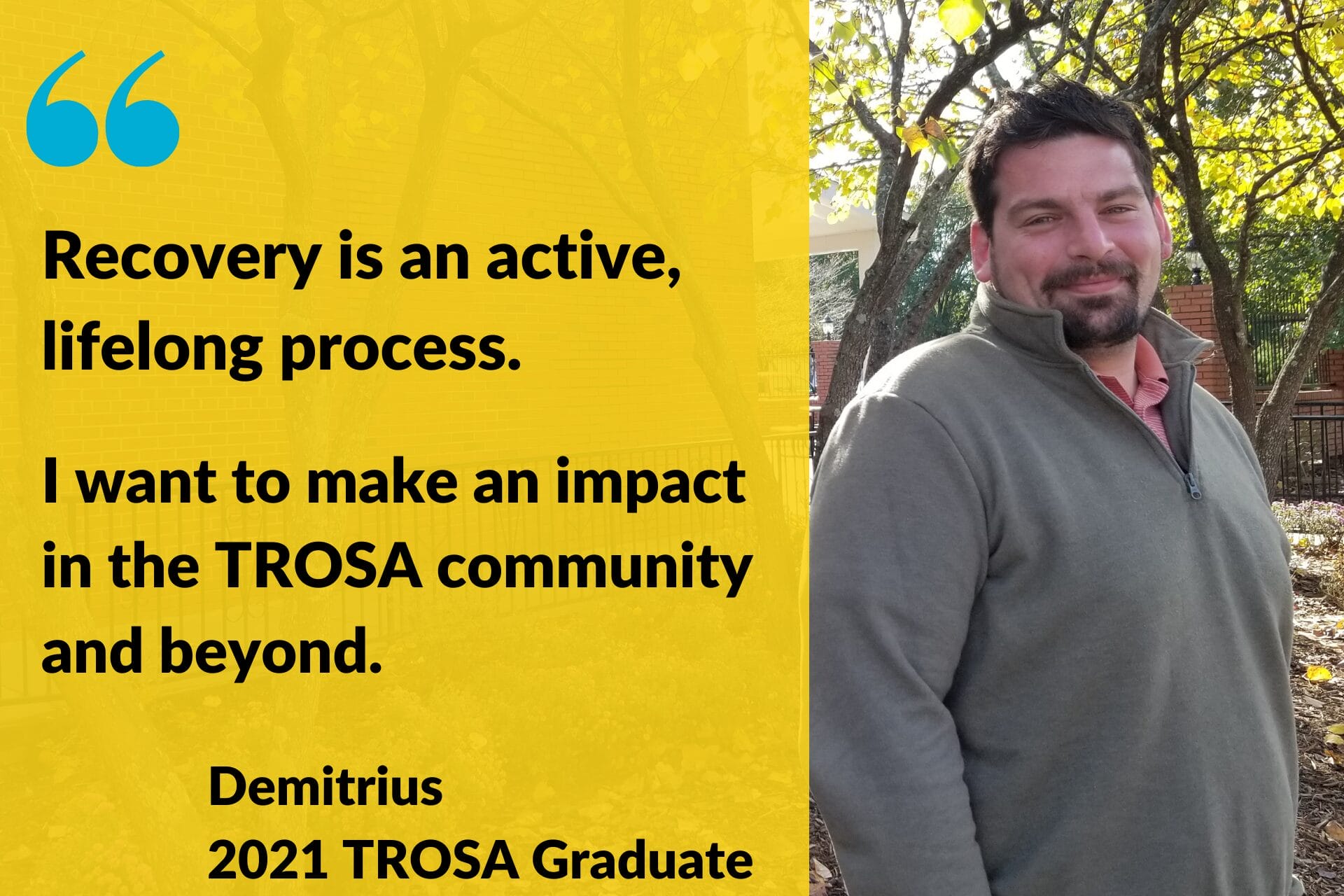Demitrius was raised by his mother and grew up with the support of his hardworking extended family. At a young age, he navigated a series of family challenges, including the death of his grandfather, the family patriarch who watched over and cared for everyone. His grandfather’s death hit Demitrius hard. “I didn’t respond very well because I didn’t know how to. I was very angry and I held a lot of guilt. I didn’t grieve properly. I didn’t know how to express emotions. I just kept it all in.” Demitrius began to act out, skipping school and abusing substances.
His truancy and substance use led to run-ins with police. He went to a juvenile detention center, a youth wilderness rehabilitation program, and a group home; but after several interventions Demitrius was quickly back to hanging out with the same people and getting into more dangerous situations.
He experienced multiple drugs of addiction before enrolling in TROSA’s program. “Whatever you can imagine, I probably did.” He was using and selling and learned about TROSA’s cost-free residential program while in Wake County Jail. He decided he didn’t want to lead the life he was living and started to write letters to TROSA. He secured an interview and acceptance to the residential program.
“When they let me out of jail, I chose not to go directly to TROSA…and I overdosed. Almost losing my life and hurting my family was the true turning point. I woke up in an ambulance in front of my mom’s house and I had no idea what happened. I thought I knew what I was capable of and I thought I knew how to handle things. In reality, I had no idea. Feelings of loss, hopelessness, and fear…it all hit me then.”
Demitrius was grateful for this second chance at life and started TROSA’s program determined to do something different. He was eager to learn how to manage his negative thoughts, emotions, and behaviors.
“I owe a lot of who I am today to the peer leadership and the overall design and structure of TROSA’s program. Talking to senior residents in the program helped me realize that learning to express yourself in a healthy way is important.”
As part of TROSA’s program model and daily therapeutic activities, all TROSA residents participate in community assignments that serve as a safe space to practice new behaviors and learn new vocational and life skills such as communication, team work, and problem solving. Demitrius was placed in TROSA Lawn Care for his first community assignment.
It was through TROSA Lawn Care Manager—and TROSA graduate—Steve Hill that Demitrius learned how to incorporate recovery into his everyday life.
“At TROSA Lawn Care, Steve showed me that each interaction you have with others can be meaningful and you can learn something if you are willing to listen and apply that to your life. Today, every interaction I have with others needs to be meaningful. I also learned that within TROSA’s community assignments, residents create their own paths to recovery.”
Demitrius also enjoyed participating in the TROSA Tree Lots, which is a fundraising event during the holiday season. “I love being at the TROSA Tree Lots,” he shares. “The beauty and the intricacy of how the Lots are designed and built are amazing. It represents the level of care that goes into everything we do. The fact that families choose to support TROSA year after year because they believe in what we do is eye-opening. It’s special. Often out there in the world, you think nobody cares. But being on the Tree Lots opened my eyes to the care that does exist in the world.”
After one year in TROSA’s program, eligible residents can take college courses to help advance their professional goals. Demitrius took courses in Computer Information Technology at Durham Technical Community College and earned a certificate in IT Foundations. He also was able to receive cost-free health services through TROSA, including dental work. “All my teeth had deteriorated in my addiction,” he shares.
In 2021, he graduated the TROSA program and applied to be a Staff-in-Training, training under the TROSA Men’s Program and Medical Department and serving as a mentor to others in recovery. On September 1, 2022 he became a TROSA staff member.
Demitrius is learning a lot about himself at TROSA. “I am learning what my weaknesses and strengths are. I learned that I am compassionate and have an analytical mind. I’ve learned now to stay present in the moment. I have found things that I’m really good at…even great at. Long-term recovery and stability are important to me. I was always a short-term person in terms of goals, but TROSA is helping me achieve long-term success. I’m trusted here and I enjoy it. I like helping people.”
He knows there are millions of men and women who need help today. “It’s ok to ask for help. Letting go of your past is needed. Addiction is so much bigger than what people think it is. It’s how we deal with our emotions and behaviors. Recovery is an active, lifelong process. Everyone in life has challenges. It’s how you choose to move forward and how to cope that makes the difference.”
Demitrius is leading by example, and making a difference in the lives of those around him. “I want to make an impact in some way. I feel I wasted so much in my life in addiction, but now I’m choosing to make my mark in life. I want to make an impact in the TROSA community and beyond.”

